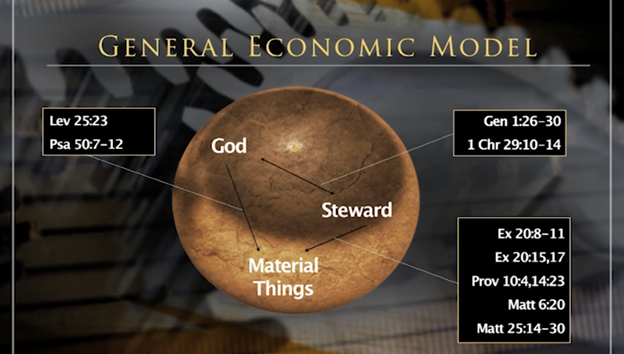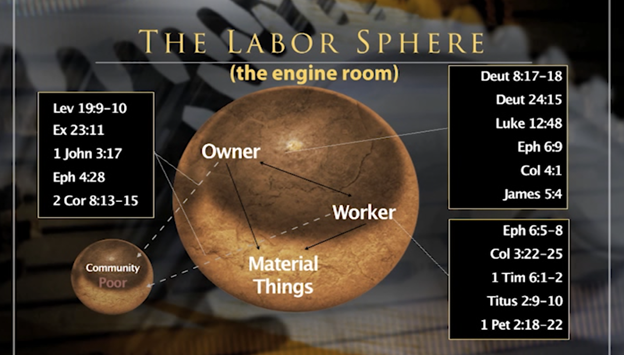This post is part 11 of a 12 part series about The Truth Project, an in-depth Christian Worldview experience led by Del Tackett and published by Focus on the Family.
In this tour, Dr. Del Tackett opens the Labor Tour of the The Truth Project with the 4th commandment (Exodus 20:8-11). Tackett takes the liberty to rephrase the ‘Sabbath Commandment’ to be the ‘Labor Commandment’ for this context. In this way, he reminds the students that most of the commandment relates to work, while only 1/7th of it relates to resting. Finally, he points out how the commandment pointed back to creation when God worked for 6 days and rested on the 7th day.
The Original Worker: God
One reason God is so concerned about work is because he is the original worker. Genesis 2:2 tells us, “And on the seventh day God finished his work that he had done, and he rested on the seventh day from all his work that he had done.” Before anyone worked a day in their life, God worked to create the world we inhabit. Scripture affirms God’s work in many passages.
- Genesis 1:1: “In the beginning, God created the heavens and the earth.”
- Psalm 19:1: “The heavens declare the glory of God, and the sky above proclaims his handiwork.”
- Psalm 102:25: “The heavens declare the glory of God, and the sky above proclaims his handiwork.”
- Colossians 1:16: “For by him all things were created, in heaven and on earth, visible and invisible, whether thrones or dominions or rulers or authorities—all things were created through him and for him.”
Appreciation of Work as God’s Gift
Work is integrated into early creation. Genesis 2:15 says, “The LORD God took the man and put him in the garden of Eden to work it and keep it.” So Adam and Eve were tasked with work in the Garden before sin ever entered the picture. Sin may have changed how work was performed (Genesis 3:16-19). Work may be more toilsome after the Fall. However, it doesn’t change the fact that work was a gift that God gave to his people.
God set the pattern by being the first worker and he is also concerned about our work. We see it in the fourth commandment and throughout the Bible. James 5:4 tells us, “Behold, the wages of the laborers who mowed your fields, which you kept back by fraud, are crying out against you, and the cries of the harvesters have reached the ears of the Lord of hosts.” In James, God sees and condemns masters who do not pay wages due to workers. God is a God who is concerned about human economic transactions.
Work is integrated into early creation.
The Truth Project
Many have appreciated God’s use of labor in the world. For instance, Johannes Gutenberg (1400-1468) invented the printing press with movable type. Gutenberg was an inventor, not a preacher. Shortly after his invention of the press, available books expanded from around 50,000 copies in the world to over 10,000,000 copies in short order. Some praised Gutenberg’s press to be the invention of the millennium. Gutenberg saw his invention (read: work) as being a eternally worthwhile effort when he wrote,
“Yes, it is a press, certainly, but a press from which shall soon flow in inexhaustible streams the most abundant and most marvelous liquor that has ever flowed to relieve the thirst of men! Through it, God will spread His word; a spring of pure truth shall flow from it; like a new star it shall scatter the darkness of ignorance and become a cause of light hithertofore unknown to shine amongst men!”

Seven General Economic Principles from Scripture
The sphere of labor is vitally important to the operation of our society. Without labor, an economy would not function. Interestingly enough, we observe principles in Scripture that undergirds every economy.
The first of these principles is that all things belong to God (Leviticus 25:23; Psalm 50:7-12). People do not ultimately own everything. Instead, God is the primary owner of all things.
The second principle is that God appointed man to be a creative steward of his goods with “ownership rights” (Genesis 1:26-30; 1 Chronicles 29:10-14). We are stewards of the material things that God ultimately owns (Exodus 20:8-11, 15, 17; Proverbs 10:4, 14:23; Matthew 6:20, 25:14-30).
One of the key aspects in these principles concerns stewardship. People are not the ultimate owners of the goods in our realm, but managers of God’s goods. Given this understanding, Paul’s admonitions to ‘bondservants’ is applicable to every worker. After all, we don’t just serve our boss or the company we work for but the Lord.
“Bondservants, obey your earthly masters with fear and trembling, with a sincere heart, as you would Christ, not by the way of eye-service, as people-pleasers, but as bondservants of Christ, doing the will of God from the heart, rendering service with a good will as to the Lord and not to man, knowing that whatever good anyone does, this he will receive back from the Lord, whether he is a bondservant or is free.” (Ephesians 6:5-8)
The third economic principle from Scripture is theft of another’s goods is wrong and coveting another’s goods is wrong (Exodus 20:15,17). There are many ways people violate these principles. Some of these include…
- Taking another’s goods
- Taking another’s intangible property
- Devaluing another’s goods or money
- Destroying another’s means of production
- Improper taxation
- Forced redistribution of wealth
- Class envy
The fourth economic principle is that skills and abilities come from God. In Exodus 35:30-33, we learn that Bezalel was gifted by “the spirit of God” to design, work in precious metals, and craft items worthy of the tabernacle. So also, our abilities are gifts from the Lord.
The fifth economic principle from Scripture is that work is profitable, good, and to be pursued; laziness is not. In both the Old and New Testaments, the Bible condemns laziness while it praises hard work (Proverbs 14:23, 10:4; 28:19; 2 Thessalonians 3:10; Matthew 25:14-30).
The sixth economic principle found in the Bible is that we should love God, but not our goods. Jesus instructs us not to store up treasures on earth where thieves do not break in and steal, etc. Instead, we are to store up treasures in heaven. We cannot serve God and money at the same time (Matthew 6:21,24).
The seventh and final economic principle is that we are to be compassionate and generous with our goods to those in need. The law instructs farmers not to strip the land at harvest, but to allow the poor to pick up the leftovers after an abundant harvest (Leviticus 19:10). In the New Testament, Paul tells us to work so that we will have enough to share with others in need (Ephesians 4:28).
“God, having stamped his creative image upon man, graciously grants his stewards the privilege to be creative and manage some of his property, which may lose (often because of sin) or multiply (often because of hard labor) and out of which they are responsible to be generous to the poor.”
Del Tackett – The Truth Project

Tackett summarized the labor lesson in the following way: “God, having stamped his creative image upon man, graciously grants his stewards the privilege to be creative and manage some of his property, which may lose (often because of sin) or multiply (often because of hard labor) and out of which they are responsible to be generous to the poor.”
Application: Responsibility in Abundance
The economic principles we find in Scripture do lead to success. Those who faithfully follow them, tend toward productivity and abundance. And when people are successful, they will have more goods than they need (Ephesians 4:28). As Christians, we must remember our responsibilities in abundance. Just as the ancient Israelites were commanded to give up some of their gleanings to the poor, Christians who succeed today are commanded to be generous to the poor in our success if the Lord blesses us in that way.
Photo by Tim Mossholder on Unsplash.



